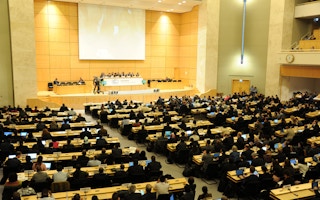International climate negotiators are gathering in Geneva, Switzerland, this coming week for the first in a series of negotiating sessions to establish an international climate agreement in Paris at the end of the year. We come into the year with momentum from 2014, which included the UN Climate Summit in New York, the US-China climate action agreement and more than $10 billion in pledges for the Green Climate Fund.
To continue reading, subscribe to Eco‑Business.
There's something for everyone. We offer a range of subscription plans.
- Access our stories and receive our Insights Weekly newsletter with the free EB Member plan.
- Unlock unlimited access to our content and archive with EB Circle.
- Publish your content with EB Premium.
The task for governments this week will be to hone and focus the draft negotiating text that countries agreed to at the Conference of the Parties (COP) in Lima last year. With just under 10 months left until the Paris COP, the pace will have to intensify, and countries will have to work toward creating an agreement ambitious enough to meet the scale of the climate change challenge. Meanwhile, two new co-chairs– Ahmed Djoghlaf of Algeria and Dan Reifsnyder of the United States – will take on their role facilitating the negotiations.
Several key issues bear watching this week as negotiators work on the text of the new climate agreement:
-
Ongoing cycles of action: Countries have agreed to submit their post-2020 climate action plans in the first quarter of this year. A key area of discussion this week will be whether or not to establish “cycles of action,” regular intervals at which countries will ramp up their domestic action plans, on a predictable schedule, such as every five years. How often should the commitments be scaled up? What kind of review process should occur around such commitments? These are the questions that will be hotly discussed in Geneva.
-
Long-term goals: An important issue for negotiators to address is where there should be a more specific long-term mitigation trajectory in the agreement. Countries have already decided to keep global average temperature below 2 degrees C (3.6 degrees F), but there is an opportunity to make that more specific, such as a goal to phase-out greenhouse gas emissions or fossil fuel use in the second half of the century. A group of companies just came out and supported such a goal. Geneva is an opportunity for negotiators to move that objective forward in order to make clear that the agreement will be aimed at transformational change. Countries are also considering proposals for a long-term goal on adaptation, which could help build resilience in communities around the world.
-
Legal architecture: Negotiators will begin to discuss how to create an effective legal architecture for the agreement. The Paris Package will include a number of legal components—the Agreement itself, as well as a series of decisions that spell out how to implement that Agreement. Put together effectively, the Paris package could not only decide what to do, but decide an implementation plan of how to do it.
For each of these issues, and others, success in Geneva means a narrowing down of options in the text, but also a greater understanding by the countries of the key decisions they will have to make very soon. The negotiations in Geneva will only start this year’s intensive process to reach a new climate agreement. But the clock is ticking—each of the negotiating sessions over the next 10 months are a vital moment for countries to accelerate their engagement and put us on a clear pathway to an ambitious, effective outcome in Paris.
David Waskow is the Director of the World Resources Institute’s International Climate Initiative. This post is republished from WRI’s Insights blog.











